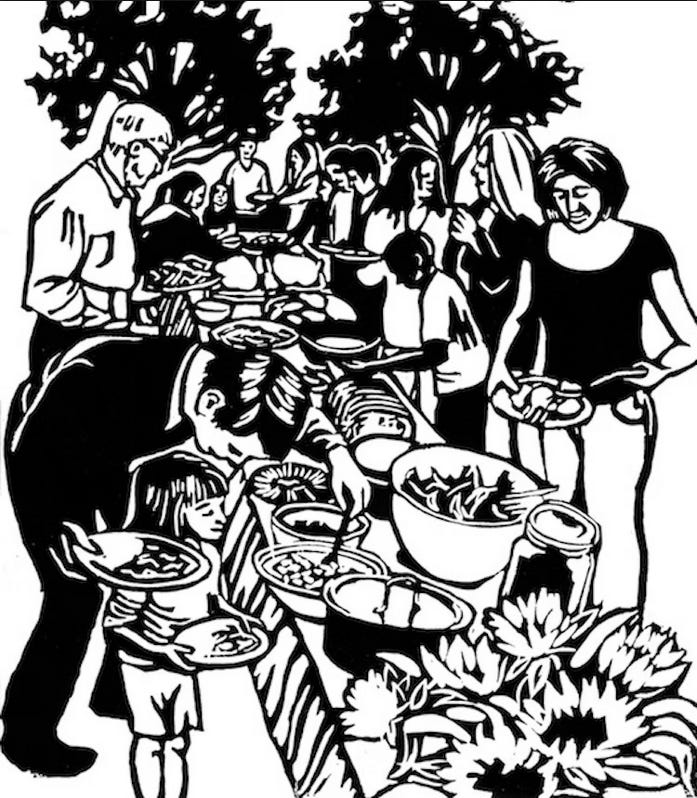The Economy Series
Hello readers. It has been some ten years since I’ve written extensively on economic topics. I intend to revisit them in 2022, because they are starting to loom large in people’s consciousness. They will likely loom larger still in the coming year, as we face the prospect of significant economic turmoil.
Economic turmoil breeds political upheaval. It can lead to revolution or, conversely, to centralized government-corporate control over people’s lives. It can also be a moment where the green shoots of community can sprout, as the tottering structures and habits of our inherited systems collapse to let in new light and air.
Art credit: Julia Jack-Scott, The Feast
Economic breakdown, as part of a larger breakdown in our defining stories, offers the opportunity for something that transcends existing ideological and political categories. It can be a gateway to the restoration of communities and what I will call “qualitative economics.” What I mean by that will become clear in this series of writings. It has actionable significance on a personal, local, organizational, and global level.
To pass through this gateway requires that we don’t get too caught up in the knee-jerk reactions and ideological formulas that come from a superficial understanding of the forces at play. Chief among these is the habit of dividing the actors in our current drama into the good guys and the bad guys. Yes, you might understand something by viewing, say, Klaus Schwab and the WEF, Big Pharma, Big Tech, Big Finance, Big Oil, or the central banks through that lens, but it obscures more than it reveals. The same for conspiracy narratives, or for turning “greed” into an elemental aspect of human nature. These simplifying, reductionistic explanations for the current mess actually perpetuate it, for they distract us from a more complete, more nuanced, but maybe less emotionally gratifying understanding.
Another set of knee-jerk reactions and ideological formulas stem from traditional political-economic philosophies. However, the entire spectrum from right to left, from libertarian capitalism to Marxist socialism, takes certain assumptions for granted that are not, or are no longer, true. In this series, I will certainly draw from classical economic concepts, but often as a way to uncover their shared covert assumptions. The assumptions go way deeper than anything we’d call “economic”; they go to the level of spirituality, myth, and metaphysics.
Rather than take weeks or months to construct an elaborate essay laying out a framework for economic transformation in the post-Covid world, I will take a non-linear approach, opening a series of windows onto the current situation as well as pathways forward. Zooming in and zooming out, I’ll write about inflation, debt, the Great Reset, war, technology, class, cryptocurrencies, digital currencies, the story of money, qualitative economics, post-growth economics, gift economics, ecological economics, and a lot more.
The perspectives I will offer can inform business models, public policies, popular uprisings, and personal practices. I want to bring them more prominently into our collective database of ideas so that they will be at the ready as the dissolution of the old normal proceeds. I also want to bring whatever clarity I can to today’s bewildering storm of contradictory sense-making. What is going on here? I won’t offer a final answer, much less a new fundamentalism. I aim to offer different questions from an unfamiliar perspective.
I plan to intersperse these economic writings with other essays over the next year. Before I jump into it, I’d like to hear from readers. Do people have an interest in what I’ve described? What questions are in your mind? How may I be of good use to you?
A little preview: That question, “How may I be of good use to you?” is one of five or ten root questions of a new (and ancient) economics. I will elaborate more in future. Thank you.
Charles Eisenstein is a reader-supported publication. To receive new posts and support my work, please consider making a donation. Thank you.

